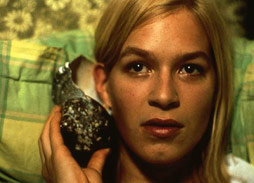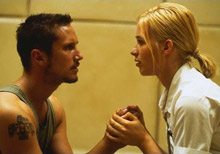The Princess and
the Warrior
aka Der Krieger und die Kaiserin |
| |
 |
Germany, 2000. Rated R. 130 minutes.
Cast: Franka Potente, Benno Fürmann,
Joachim Król, Lars Rudolph, Marita Breuer, Melchior Belson, Jürgen Tarrach,
Ludger Pistor, Staffen Schult, Rolf Dannemann, Gottfried Breitfuß, Susanne
Bredehöft, Christa Fast
Writer: Tom Tykwer
Music: Reinhold Heil, Johnny Klimek, Tom Tykwer
Cinematographer: Frank Griebe
Producers: Stefan Arndt, Maria Köpf
Director: Tom Tykwer
LINKS
|
 ave
you ever been walking through a museum and suddenly found yourself standing
too close to an oversized wall painting? You can see only a bit of it, and you
must step back to view more of it, and keep stepping back until you can take
in the whole painting at once. Watching The Princess and the Warrior,
the latest effort from gifted German director Tom Tykwer (Run Lola Run, Winter
Sleepers, Deadly Maria), is like stepping back from an oversized wall
painting. Only when the film is complete can you begin to make out how all the
individual pieces bind together to create a boldly imagined, albeit imperfect,
film.
ave
you ever been walking through a museum and suddenly found yourself standing
too close to an oversized wall painting? You can see only a bit of it, and you
must step back to view more of it, and keep stepping back until you can take
in the whole painting at once. Watching The Princess and the Warrior,
the latest effort from gifted German director Tom Tykwer (Run Lola Run, Winter
Sleepers, Deadly Maria), is like stepping back from an oversized wall
painting. Only when the film is complete can you begin to make out how all the
individual pieces bind together to create a boldly imagined, albeit imperfect,
film.
Tykwer is fascinated by lives and destinies intertwined. Like the remarkable
Winter Sleepers, The Princess and the Warrior juxtaposes lives
on seemingly parallel tracks that inexorably converge. Tykwer's movies contain
coincidences that might seem preposterous in a different context, but in a Tykwer
film, they are not coincidences at all. They are perfectly normal events--to
be expected, even. There are Larger Forces at work that bring his characters
together.
In The Princess and the Warrior, the characters brought together are
Sissi (Franka Potente) and Bodo (Benno Fürmann). In Tykwer's hometown of Wuppertal,
Sissi is a nurse at a residential facility for the mentally ill, where she also
resides. She doesn't venture much into the outside world. Her best friends are
another nurse and a blind patient. Sissi is played with grace and nuance by
Potente, who appears here as an attractive but shy and mousy blonde, quite a
change from her aggressively red-haired punk in Run Lola Run and her
sexy drug-smuggling flight attendant in Blow.
Fürmann, who recalls Sean Penn in his more reserved performances, is similarly
outstanding as Bodo, an underemployed young man given to petty crime. Bodo is
a man trapped in the past, unable to live in the present day because of a Tragic
Event. Due to what he claims is a genetic problem, he cries uncontrollably.
Bodo lives with his older brother, Walter (Joachim Król), an ordinary working
schlub who tries to watch out for him.  Together,
they plot to leave their lives behind and move to Australia. They plan to fund
their trip, however, via a heist of the bank where Walter works as a security
guard.
Together,
they plot to leave their lives behind and move to Australia. They plan to fund
their trip, however, via a heist of the bank where Walter works as a security
guard.
Although it may surprise those who have only seen the kinetic Run Lola Run,
one of Twyker's most impressive gifts is creating rich, multidimensional characters.
In The Princess and the Warrior he is patient, perhaps to a fault (some
viewers may get bored), in his intimate examination and development of not just
the two protagonists, but the secondary characters as well. The residents at
the hospital are as individually realized as the mental patients in One Flew
Over the Cuckoo's Nest, and Sissi's relationship to them is even more complex
than it first appears. At the same time, like in Winter Sleepers, Tykwer
leaves certain key facts unrevealed in order to divulge them at the most effective
juncture later in the story.
Tykwer's painstaking approach results in a film that is far more static and
subdued than Run Lola Run or even Winter Sleepers, but this is
still Tykwer we're talking about. He again displays a love of vibrant primary
colors, and like past Twkwer protagonists, Sissi is color-coded (in yellow and
some green). Like other Tykwer films, The Princess and the Warrior, is
driven by its electronic, mood-enriching score, again written in part by Tykwer
himself. Tykwer still has a knack for making your heart catch in your throat
with a camera movement, as when the camera dives into a seashell that Sissi
holds up to her ear. His cinematographer and longtime collaborator, Frank Griebe,
seemingly is able to realize any shot, no matter how difficult or unusual.
The Princess and the Warrior contains a series of scenes and images
that stick with you long after the film ends. Sissi and Bodo's first encounter,
an oddly quiet scene in which he tries to save her life after she is hit by
a truck, is nauseating, yet simultaneously affecting. The daringly staged conclusion,
in which Bodo comes literally face-to-face with his past, is even more effective.
A climactic scene on the roof of the hospital, however, is a dramatic letdown
more likely to leave you puzzled than moved.
The Princess and the Warrior is about a great many things, including
love, loss, and identity. Unlike Run Lola Run and Winter Sleepers,
The Princess and the Warrior is not a fully satisfying effort. By trying
to cover a little too much ground, the film sometimes feels like it has lost
its compass, and it is occasionally spoiled by vague writing. The film would
have benefited from a tighter thematic focus. Nevertheless, it is one of those
rare movies that continually reinvents itself while building on what has gone
before. Like The Crying Game, for example, each plot development opens
the door to new themes and ideas, and the film continually refuses to be about
whatever it seems to be about at any given moment.
Review
© July 2001 by AboutFilm.Com and the author.
Images © 2001Sony Pictures Classics. All Rights Reserved.

 Together,
they plot to leave their lives behind and move to Australia. They plan to fund
their trip, however, via a heist of the bank where Walter works as a security
guard.
Together,
they plot to leave their lives behind and move to Australia. They plan to fund
their trip, however, via a heist of the bank where Walter works as a security
guard.
